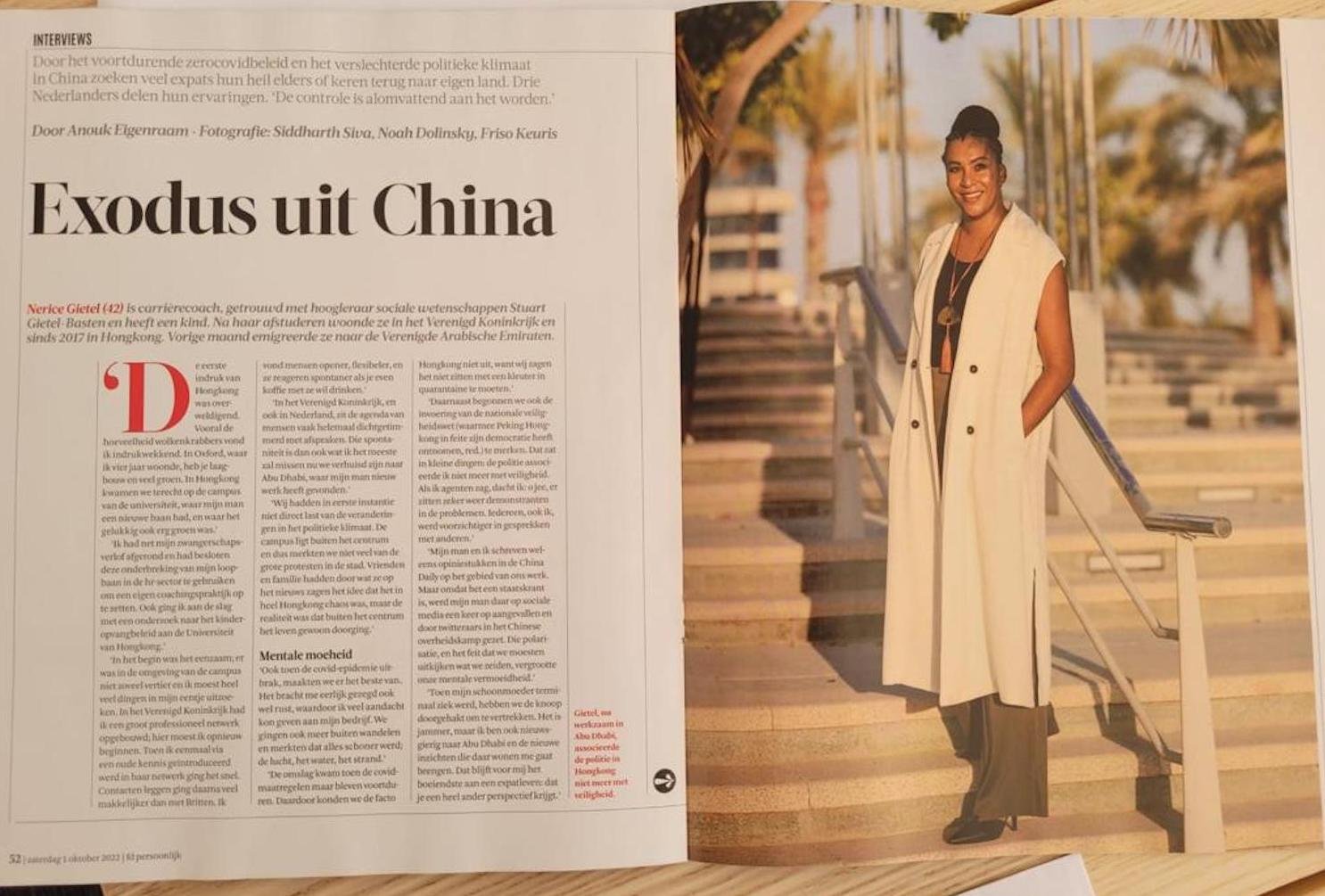Dutch Entrepreneurs About Their Departure From China
I was recently featured in an article that was published in the Dutch newspaper, Het Financieele Dagblad (The Dutch Financial Times) and their weekend magazine, Persoonlijk (Personal). The following blog is a translation of the article and explains why we chose to leave Hong Kong. Being interviewed and talking about the relocation made me relive the challenges of moving my home and family, and restarting professionally once again in a new city. Navigating one’s career through life’s transitions is one of my key areas of focus in my career coaching services.
Due to the ongoing zero-covid policy and the deteriorating political climate in China, many expats seek refuge elsewhere or return to their own country. Three Dutch people share their experiences.
Published in Het Financieele Dagblad, online 27/9/2022, print in FD Persoonlijk Magazine Zaterdag 1/10/2022
Author: Anouk Eigenraam
Nerice Gietel (42) is a career coach, married to Professor of Social Sciences, Stuart Gietel-Basten, and they have a daughter. After graduating, Nerice lived in the UK for some years and, since 2017, in Hong Kong with her family. Last month she emigrated to the United Arab Emirates. (Photo: Siddharth Siva/Phenster)
Her first impression of Hong Kong was overwhelming. “I especially found the skyscrapers impressive. In Oxford, where I lived for four years, there were mostly low-rise buildings and lots of greenery. In Hong Kong we lived on the university campus, where my husband had a new job, and where fortunately it was also very green.”
“I had just completed my maternity leave and decided to take this break from my career in the HR sector to set up your own coaching practice. I also took a contract role working on research into the Hong Kong childcare policy at the University of Hong Kong.'
“In the beginning it was lonely; there was not a lot of entertainment in the vicinity of the campus and I had to figure out a lot of things on my own. In the UK, I had a big professional network; there I had to start over. Once an acquaintance of mine introduced me to her network, things started moving fast. Making contacts went much easier after that than with Brits. I found people more open, flexible, more spontaneous and responsive if you want to have a coffee with them.”
“In the Netherlands, and also in the UK, people’s agendas are often completely booked up with prior engagements. That spontaneity in Hong Kong is what I will miss the most now we moved to Abu Dhabi, where my husband found new work.”
“From what they saw on the news all over the world, friends and family had the idea that Hong Kong was in complete chaos 24-7. But, as the campus is far outside of the city centre where the protests were occurring, it did not so much affect the physical activities of our day-to-day lives. Even within the city centre, life appeared to be going as usual for most days.”
(Photo: Siddharth Siva/Phenster)
Mental Fatigue Following COVID-19 Restrictions
"Even when the Covid epidemic broke out, we made the best of it. In all honest,y it brought me a sense of calm which allowed me to give a lot of attention to my company. We went for walks more often and, because of the shutdown of industry across the border, we started noticing that everything got cleaner; the sky, the water, the beach.”
“The turning point came when the Covid measures got stricter and seemed to continue forever. As a result, we were effectively unable to leave Hong Kong, because we didn't want to have to quarantine for three weeks with a toddler upon return.'
“In addition, the implementation of the National Security Law had started. That was noticeable in small things: I no longer automatically associated the police with my own security. When I saw the cops, I thought: oh dear, some young people are in trouble. Everyone, including me, became more careful in conversations with others.”
“My husband and I used to write op-eds about our work in the China Daily. But because it's a state newspaper, my husband once got trolled on social media and people on Twitter assumed he was in the Chinese government camp. That polarisation, and the fact that we had to watch what we said increased our mental fatigue.”
“When my mother-in-law became terminally ill, we decided to leave. It's a shame, but I'm also curious about Abu Dhabi and the new insights that living there will bring me. For me, that remains the most exciting part of expat life: that you get a completely different perspective.'


